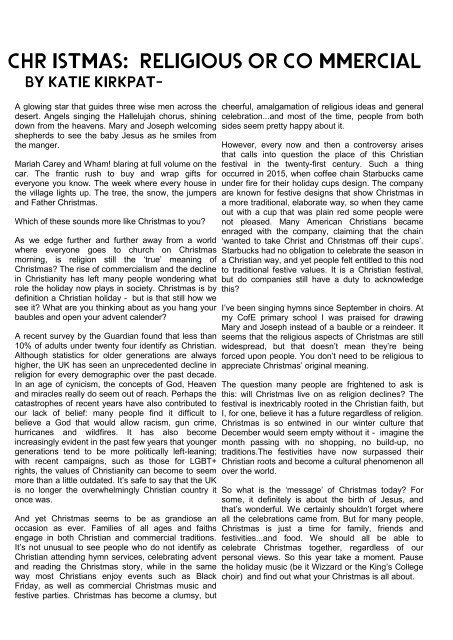The Inkling Volume 2
You also want an ePaper? Increase the reach of your titles
YUMPU automatically turns print PDFs into web optimized ePapers that Google loves.
Chr istmas: Religious or Co mmercial<br />
By Katie Kirkpat-<br />
A glowing star that guides three wise men across the<br />
desert. Angels singing the Hallelujah chorus, shining<br />
down from the heavens. Mary and Joseph welcoming<br />
shepherds to see the baby Jesus as he smiles from<br />
the manger.<br />
Mariah Carey and Wham! blaring at full volume on the<br />
car. <strong>The</strong> frantic rush to buy and wrap gifts for<br />
everyone you know. <strong>The</strong> week where every house in<br />
the village lights up. <strong>The</strong> tree, the snow, the jumpers<br />
and Father Christmas.<br />
Which of these sounds more like Christmas to you?<br />
As we edge further and further away from a world<br />
where everyone goes to church on Christmas<br />
morning, is religion still the ‘true’ meaning of<br />
Christmas? <strong>The</strong> rise of commercialism and the decline<br />
in Christianity has left many people wondering what<br />
role the holiday now plays in society. Christmas is by<br />
definition a Christian holiday - but is that still how we<br />
see it? What are you thinking about as you hang your<br />
baubles and open your advent calender?<br />
A recent survey by the Guardian found that less than<br />
10% of adults under twenty four identify as Christian.<br />
Although statistics for older generations are always<br />
higher, the UK has seen an unprecedented decline in<br />
religion for every demographic over the past decade.<br />
In an age of cynicism, the concepts of God, Heaven<br />
and miracles really do seem out of reach. Perhaps the<br />
catastrophes of recent years have also contributed to<br />
our lack of belief: many people find it difficult to<br />
believe a God that would allow racism, gun crime,<br />
hurricanes and wildfires. It has also become<br />
increasingly evident in the past few years that younger<br />
generations tend to be more politically left-leaning;<br />
with recent campaigns, such as those for LGBT+<br />
rights, the values of Christianity can become to seem<br />
more than a little outdated. It’s safe to say that the UK<br />
is no longer the overwhelmingly Christian country it<br />
once was.<br />
And yet Christmas seems to be as grandiose an<br />
occasion as ever. Families of all ages and faiths<br />
engage in both Christian and commercial traditions.<br />
It’s not unusual to see people who do not identify as<br />
Christian attending hymn services, celebrating advent<br />
and reading the Christmas story, while in the same<br />
way most Christians enjoy events such as Black<br />
Friday, as well as commercial Christmas music and<br />
festive parties. Christmas has become a clumsy, but<br />
cheerful, amalgamation of religious ideas and general<br />
celebration...and most of the time, people from both<br />
sides seem pretty happy about it.<br />
However, every now and then a controversy arises<br />
that calls into question the place of this Christian<br />
festival in the twenty-first century. Such a thing<br />
occurred in 2015, when coffee chain Starbucks came<br />
under fire for their holiday cups design. <strong>The</strong> company<br />
are known for festive designs that show Christmas in<br />
a more traditional, elaborate way, so when they came<br />
out with a cup that was plain red some people were<br />
not pleased. Many American Christians became<br />
enraged with the company, claiming that the chain<br />
‘wanted to take Christ and Christmas off their cups’.<br />
Starbucks had no obligation to celebrate the season in<br />
a Christian way, and yet people felt entitled to this nod<br />
to traditional festive values. It is a Christian festival,<br />
but do companies still have a duty to acknowledge<br />
this?<br />
I’ve been singing hymns since September in choirs. At<br />
my CofE primary school I was praised for drawing<br />
Mary and Joseph instead of a bauble or a reindeer. It<br />
seems that the religious aspects of Christmas are still<br />
widespread, but that doesn’t mean they’re being<br />
forced upon people. You don’t need to be religious to<br />
appreciate Christmas’ original meaning.<br />
<strong>The</strong> question many people are frightened to ask is<br />
this: will Christmas live on as religion declines? <strong>The</strong><br />
festival is inextricably rooted in the Christian faith, but<br />
I, for one, believe it has a future regardless of religion.<br />
Christmas is so entwined in our winter culture that<br />
December would seem empty without it - imagine the<br />
month passing with no shopping, no build-up, no<br />
traditions.<strong>The</strong> festivities have now surpassed their<br />
Christian roots and become a cultural phenomenon all<br />
over the world.<br />
So what is the ‘message’ of Christmas today? For<br />
some, it definitely is about the birth of Jesus, and<br />
that’s wonderful. We certainly shouldn’t forget where<br />
all the celebrations came from. But for many people,<br />
Christmas is just a time for family, friends and<br />
festivities...and food. We should all be able to<br />
celebrate Christmas together, regardless of our<br />
personal views. So this year take a moment. Pause<br />
the holiday music (be it Wizzard or the King’s College<br />
choir) and find out what your Christmas is all about.




